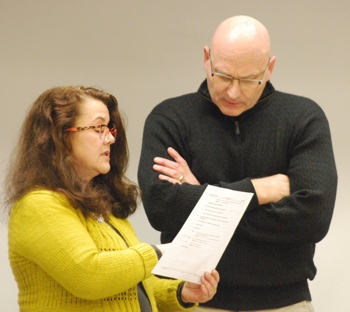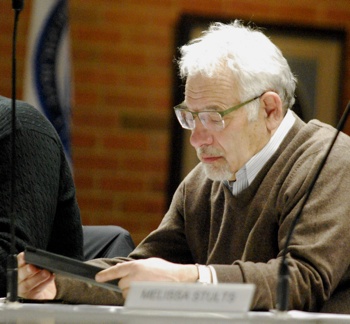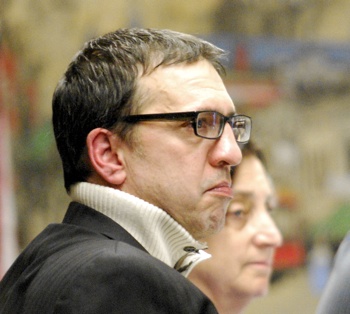Rotary to Fund Universal Access Playground
Ann Arbor park advisory commission meeting (Jan. 28, 2014): Park commissioners got news at their most recent meeting that the Rotary Club of Ann Arbor is making a $250,000 contribution to the city of Ann Arbor for a major new “universal access” playground at Gallup Park, to celebrate the club’s centennial anniversary in 2016.
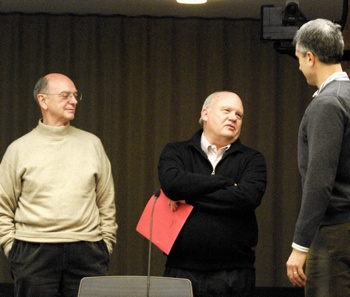
From left: Bernie Lugauer and Bob Buckler of the Rotary Club of Ann Arbor talk with Christopher Taylor, an ex officio member of the Ann Arbor park advisory commission. (Photos by the writer.)
After a presentation on Jan. 28, commissioners recommended that the city apply for a state Dept. of Natural Resources grant to help fund the remainder of the work, which is estimated to cost $500,000.
Colin Smith, the city’s parks and recreation manager, told commissioners that although there are about 80 playgrounds in Ann Arbor, none are universally accessible. It’s a “huge shortcoming” for the parks system, he said. The exact location within Gallup Park hasn’t been determined, but the playground would be about 5,000 square feet and exceed the requirements of the Americans with Disabilities Act (ADA). The design and equipment is intended to create environments that can be used by all people, with features like ramps, color-contrasting structures, wider bridges and walkways, and playground equipment that makes it easier for people using wheelchairs.
Two Rotary representatives attended the Jan. 28 meeting to help describe the club’s role in the project. Bob Buckler, a Rotary director and co-chair of the group’s centennial committee, told commissioners that in general the Rotary’s primary focus is on supporting children, by funding scholarships, Washtenaw Success By Six and other programs. That’s why the universal access playground is so appealing as a way to celebrate Rotary’s centennial, he said. Buckler indicated that fundraising for this project has already begun. The grand opening is expected to be on Labor Day in 2016.
In other action on Jan. 28, commissioners approved the location for new tennis courts at Windemere Park – a project that’s been in the works for about two years. The location has been somewhat controversial among neighbors, and prompted a review of the previously selected site. The current courts have deteriorated and are in a location where it’s unsuitable to rebuild.
Also on Jan. 28, PAC recommended the purchase of two vans to keep up with the increasing shuttle transportation demands for Huron River trips in 2013, following the opening of Argo Cascades.
The meeting marked a transition of members on PAC. It was the first meeting for David Santacroce, who was appointed by the city council last year to replace Julie Grand. And it was the final meeting for Jen Geer, who has resigned after less than a year on the commission. Paige Morrison was appointed by the council on Feb. 3 to fill the remainder of Geer’s term – through May 19, 2016.
Universal Access Playground
At its Jan. 28 meeting, PAC considered a resolution recommending that the city apply for a state Dept. of Natural Resources grant to help fund a “universal access” playground at Gallup Park.
Colin Smith, the city’s parks and recreation manager, gave a special presentation on the universal access playground at Gallup Park, funded in part with a $250,000 contribution from the Rotary Club of Ann Arbor to celebrate the club’s centennial anniversary in 2016.
Smith told commissioners that the city has 80 playgrounds, but none of them have universal access. “It’s really a great shortcoming in the parks system,” he said. Such playgrounds aim to exceed the requirements of the Americans with Disabilities Act (ADA), and strive to be as inclusive as possible. The design is intended to create environments that can be used by all people.
The design and equipment for this type of playground is more expensive. The playground will include ramps, color-contrasting structures, wider bridges and walkways, and playground equipment that makes it easier for people with wheelchairs to use, for example.
Smith then introduced Bob Buckler, a Rotary board director and co-chairman of the club’s centennial committee, along with Bernie Lugauer. Buckler described Rotary as the largest service organization in the world, primarily focused on humanitarian projects. The Rotary Club of Ann Arbor is one of the largest clubs, he added – it’s the largest club in Michigan, and the 32nd largest Rotary club in the world, with 350 members. [There are several Rotary clubs in this area. The Rotary Club of Ann Arbor holds its weekly meetings at the Michigan Union.]
Buckler told commissioners that the club’s focus in this community is the children of Ann Arbor and Washtenaw County. Support includes scholarships to Washtenaw Community College, and funding for Washtenaw Success By Six and other programs.
In 2016, the Ann Arbor club will be 100 years old, Buckler said, and they’ve been trying to figure out an appropriate gift back to the community on this occasion. They evaluated many options, he said. Describing their relationship with Colin Smith as a “godsend,” Buckler said they came up with a project that will be great for the community and all children, and something that Rotary members will be incredibly proud of. The club is committing $250,000 and has already started fundraising for it, he said. He hoped commissioners would endorse it and provide input to make it the best playground possible.
Smith continued his presentation, describing the values that Rotary and the city’s parks and recreation system share: community service and the goal of enhancing quality of life.
He noted that an ADA playground complies with minimum accessibility standards as established by the Americans with Disabilities Act – that is, it meets the letter of the law. But universal access playgrounds go further, with the goal of being usable by all people. It’s one of the elements highlighted in the city’s parks and recreation open space (PROS) plan, he noted.
Design elements include a playground surface that’s level with the entire perimeter of the playground, so that people can access the playground easily. The surface is made out of material that’s uniform, and that’s easy for someone with a wheelchair or a walker to use. Ramps are used to provide access to different levels of the play structures. Equipment is designed to be used for multiple purposes, including platforms to help transfer children from wheelchairs, for example. Paths and bridges are wide enough to accommodate a child in a wheelchair and a caregiver. Interactive play elements are at ground level, using high-contrasting colors for people with poor eyesight.
One aspect of this kind of playground that’s often overlooked, Smith said, is that it doesn’t just provide access to children, but can also be used by parents who are in a wheelchair or have other accessibility needs.
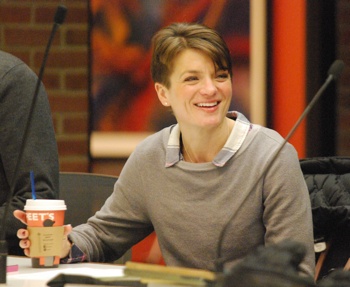
It was the last meeting for Jen Geer, who resigned after less than a year through her three-year term.
The parks staff is recommending that the playground be located at Gallup Park because it’s a popular regional park, attracting people from beyond Ann Arbor. “Having a playground like this there paints Ann Arbor in a very good light,” Smith said. In addition, an existing playground by the children’s pond isn’t in good shape, he noted, and it needs to be replaced. That replacement is already included as a potential project in the city’s capital improvements plan (CIP). The location of the new playground within the park, which would be about twice the size of the existing one, is yet to be determined.
The total cost of the 5,000-square-foot playground is estimated at $500,000 – including the design, construction, equipment and landscaping. “It’s not an inexpensive project, by any stretch of the imagination,” Smith said.
In addition to the Rotary funding, the city would contribute $100,000 to the project. It’s hoped that some of the remaining $150,000 funding would be provided by a grant from the state’s Dept. of Natural Resources grants management program. The project would be attractive for a grant because it would provide universal access in a heavily used park. Smith noted that PAC would be voting on a recommendation to apply for a grant later in the meeting. Although no amount has yet been specified, Smith said it’s likely that the grant application will be for the balance of the project – $150,000.
Outlining the potential timeline, Smith noted that the deadline for the current grant cycle is April 1, 2014. This year would be spent on public input, design and approval, with city council approval of a construction contract targeted for 2015, and groundbreaking in the spring of 2016. The new playground is anticipated to be open by Labor Day of 2016.
Smith also described several ways that the city could recognize the Rotary club for its contribution, including the possibility of naming the playground, and installing plaques to indicate how the playground was funded.
Universal Access Playground: Commission Discussion
Alan Jackson suggested that the playground structure itself could perhaps be designed to incorporate the word “Rotary” into it. He observed that this type of playground might lead to more demand for ADA parking nearby, and he’d be supportive of that. It’s something to be sensitive to as the project moves forward, he said.
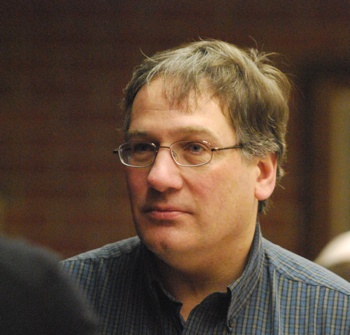
Ann Arbor park advisory commissioner Alan Jackson, who also serves on the board of the Leslie Science & Nature Center.
Jackson also wanted to be prepared to maintain the playground for use all year, even during the winter months. Colin Smith reported that the city is hiring a playground safety inspector. He said it’s not unusual to see children using playgrounds in the winter.
Bob Galardi wondered who’d be in control of this project, after all of the funding is in place. Smith replied that this project is analogous to the Ann Arbor skatepark that’s now under construction at Veterans Memorial Park. It’s located in a city park and becomes city property, even though much of the funding comes from various non-city sources. The city will oversee the public engagement, design and construction.
Karen Levin asked about other playgrounds at Gallup Park. There is another playground located at the canoe/kayak livery, Smith said, on the opposite end of the park.
Several commissioners thanked the Rotary for helping the city with this project.
Regarding PAC’s resolution on the grant application, Smith noted that the process works like this: Staff will come to PAC to ask for a recommendation to submit the application, then that recommendation is forwarded to the city council for approval.
Alan Jackson noted that the resolution is specific to the DNR grant. He suggested amending it to recommend support for applying for other funding in general. Galardi wondered if it was important to identify a specific source. Smith indicated that it would be preferable to have separate resolutions for each grant application.
Smith noted that the application for a grant can have implications on public policy – that’s why grants require council approval. As a hypothetical – and he stressed that this was indeed a hypothetical case – if city staff applied for a grant to remove the Argo Dam and the grant were awarded, that would have policy implications that are the purview of the city council.
Galardi agreed, saying the city doesn’t want “grants gone wild.” He moved the resolution recommending that the city apply for the DNR grant.
Outcome: The recommendation to apply for the DNR grant to help fund a universal access playground passed unanimously.
Windemere Park Tennis Courts
Commissioners were asked to approve a revised new location for tennis courts at Windemere Park, on the city’s northeast side. The new location for the tennis courts has been disputed among neighbors who live near Windemere Park, a nearly four-acre parcel north of Glazier Way between Green and Earhart roads.
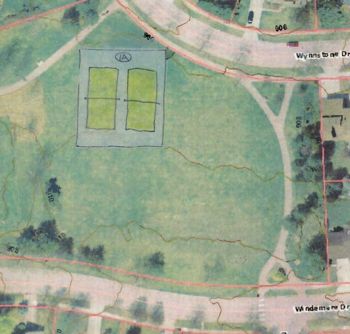
Recommended new location for new Windemere Park tennis courts. (Image included in Jan. 28, 2014 meeting packet for the Ann Arbor park advisory commission.)
The tennis courts there have deteriorated, and the city has been looking at options for replacing them. Neighbors had originally advocated keeping the courts in the same location, but the soil there is unstable. Before the area was developed, the current location of the courts was a pond.
In 2012, city staff held two public meetings to seek input on options for locating the new courts. The option recommended by staff – to locate the courts to the east of the current location – was one that a majority of residents at a public meeting on Oct. 8, 2012 had favored. That location was ultimately recommended by PAC at its Oct. 16, 2012 meeting.
The cost of the project was estimated at around $100,000. Bids were expected to be solicited, with construction to take place in the summer of 2013.
However, some neighbors subsequently raised concerns about the option that was recommended by PAC – Option 4 of the four options that were considered. It had been a compromise proposal, moving the tennis courts closer to the center of the existing open space at the park, farther away from homes around the perimeter of the park, compared to other options.
Because of those concerns, staff held off on construction of the new tennis courts and have been talking with residents about other alternatives. Residents conducted an online Doodle poll comparing the option that was recommended by PAC to one of the other options – Option 1, located slightly further to the north – that had been rejected. Lobbying for Option 1 at a PAC meeting on Nov. 19, 2013 were several residents – including representatives of the Earhart Knolls and Glacier Highlands homeowners associations. Ward 2 Ann Arbor city councilmember Jane Lumm also attended that meeting and advocated for Option 1, on behalf of residents.
There was not universal agreement, however, so additional input was sought, including a survey on Ann Arbor Open City Hall. The parks staff also held another public meeting on Jan. 15, 2014, which was attended by about two dozen residents, several park advisory commissioners and some city councilmembers. At that meeting, yet another option – labeled Option 1A – was brought forward. It shifted the location in Option 1 slightly to the north and east, and changed the location of the path entering the courts.
Windemere Park Tennis Courts: Public Commentary
Rita Benn reminded commissioners that she had spoken to PAC last year, when they made the decision to hold a third public meeting regarding the location of tennis courts at Windemere Park. [The PAC meeting that Benn mentioned took place on Nov. 19, 2013.]
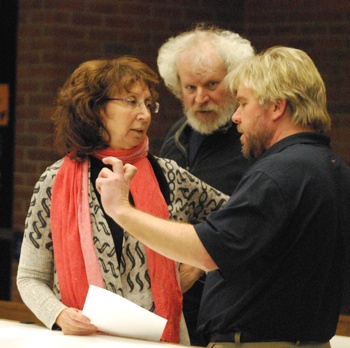
Rita Benn, a resident who lives near Windemere Park, talks with Colin Smith, the city’s parks & recreation manager.
Benn said that several city councilmembers, PAC members and community members attended the public meeting on Jan. 15, 2014 at the Gallup Park meeting room. She praised Colin Smith, the city’s parks and recreation manager, for maintaining calm and presenting the information.
After hearing all the information, Benn still supported Option 4, which was the compromise made at the previous public meeting – on Oct. 8, 2012. A major contention had been that children would be playing in a different direction, she said – north/south, instead of east/west. There were no safety issues, however, she noted, and she hoped that the commission would recommend Option 4.
Benn also referred to Option 1A, which was introduced at the Jan. 15, 2014 public forum. It would move the location of the tennis courts further away from her property, but it wouldn’t be as aesthetically pleasing as Option 4, she said.
Regardless of the option that PAC recommends, Benn said, she hoped they would include a recommendation for landscaping around the tennis courts. It would also be good to have landscaping for the site of the current tennis courts, she added, so that the area won’t be an eyesore after those courts are removed.
Ed Weiss of the Earhart Knolls Homeowners Association and Jeff Alson, a member of the Glacier Highlands Homeowners Association, had previously addressed PAC during the Nov. 19, 2013 meeting, in support of Option 1. They also attended the Jan. 28 meeting but did not address the commission during public commentary. City councilmember Jane Lumm (Ward 2), who also had advocated for Option 1 on Nov. 19, attended the Jan. 28 meeting but did not speak formally to commissioners.
Windemere Park Tennis Courts: Commission Discussion
Graydon Krapohl, PAC’s vice chair, gave a report about the Jan. 15 public forum that was held on this issue. At that forum, Colin Smith, the city’s parks and recreation manager, had reviewed the four options that had been considered, as well as an overview of the project’s history. About 25 community members attended, Krapohl said, as well as himself, Ingrid Ault and Alan Jackson from PAC. Attending from city council were Christopher Taylor, who serves as one of two ex officio members of PAC, and both Ward 2 council representatives – Sally Petersen and Jane Lumm. The park is located in Ward 2.
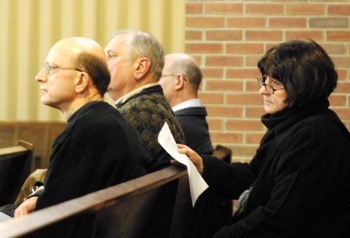
From left: Jeff Alson of the Glacier Highlands Homeowners Association and Ed Weiss of the Earhart Knolls Homeowners Association. Sitting behind them is city councilmember Jane Lumm (Ward 2).
Krapohl said the group had a good discussion about the pros and cons of all four options. [.pdf of options] Options 2 and 3 weren’t seen as desirable, he said. Option 1 was modified during the forum to shift the location slightly to the northeast, and move the entrance into the courts from the west to the east side. [That new location was labeled Option 1A.] The project would include “enhanced landscaping,” he said, to provide more cover between the courts and nearby houses.
Alan Jackson noted that Option 1A had been introduced at the Jan. 15 forum for the first time – and that kind of last-minute option had been a problem at the previous public meetings. He hoped there had been enough time for Option 1A to be reviewed by the community.
The resolution considered by PAC included a statement that this project should be no more than 10-20% above normal reconstruction costs. Responding to a query from Bob Galardi, Smith noted that the commission’s meeting packet included a lot of information about soil borings and other tests related to the different site options. All of the potential sites are suitable for tennis courts, he said, so it’s expected that the construction bids would be within normal reconstruction costs. However, until the city actually receives the bids, he added, it’s not possible to say for sure. Parks planner Amy Kuras noted that the cost will be somewhat higher than normal, because of plans to include storm drains.
Ingrid Ault said the Jan. 15 public forum included discussion of the orientation of the tennis courts. The orientation needs to be north/south, so that the players aren’t looking into the sun. There was also discussion of how the soccer fields in Windemere Park are oriented from east to west, she said. Jackson added that the discussion also touched on how to keep the largest possible contiguous piece of property available for other uses, like baseball, soccer and Frisbee.
Ault reported that the owner of the home located closest to the tennis courts in Option 1A did not attend the Jan. 15 public forum.
Regarding the site where the current tennis courts will be removed, Krapohl noted that it’s in a location that was previously a pond, so it will take a few years to seed. Kuras added that she’s looking at doing some soil stabilization at the old site, as well as regrading the site and putting in drain tile.
Smith summarized results from a survey that the city conducted about this project, using Ann Arbor Open City Hall. [.pdf of survey responses] Of the 95 respondents, 68 (about 70%) preferred Option 1. Ault noted that Option 1A wasn’t included in the survey, because the survey occurred prior to the Jan. 15 forum when that option was presented as an alternative.
Jackson said the main difference between Option 1 and Option 1A is the entrance. He also thought that 1A offered better screening for the neighbors, and mitigates some of the problems for nearby homes. It also has the merit of preserving a large portion of the park for other uses, he said.
Ault noted that the Jan. 15 public forum discussion included talk about windscreens. Smith replied that there are different views about such screens. The only tennis courts in the city’s parks system that use windscreens are at Veterans Memorial Park. Players tend to like them, he said, but screens are “less preferable” for people who live nearby, because of the aesthetics.
Ault told commissioners that part of this discussion should include how the park is used overall, because the objection they’d heard about Option 4 was that it put the courts in the middle of a large field, which would disrupt soccer, baseball, pick-up football and other play. Krapohl described it as a community park, where kids have a safe place to play.
Galardi noted that Option 1A seemed to be the best solution. “We know that there’s a demand for tennis – otherwise, people wouldn’t be clamoring to have this fixed,” he said. There aren’t a lot of tennis courts in that part of town, he added.
Galardi then formally proposed selecting Option 1A for the new tennis courts.
Outcome: Commissioners voted to approve Option 1A for new tennis courts at Windemere Park. David Santacroce abstained.
Jackson asked staff to inform PAC if there’s any delay in implementing this project.
Van Purchase
Commissioners were asked to recommend purchasing two 15-seat GMC Savana passenger vans from Red Holman GMC in Oakland County for a total of $50,212.
According to a parks staff memo, the city’s current fleet of seven 15-passenger vans was unable to keep up with the increasing shuttle transportation demands for Huron River trips in 2013, following the opening of Argo Cascades. Between 2012 and 2013, the city saw a 22% increase in rentals. More vans are needed to transport people on these trips, which start at the Argo livery and end at Gallup Park. “There were some very long waits last year,” Smith said, and it’s something that the parks and recreation staff hope to improve.
They don’t plan to increase the number of canoes or kayaks, he added. Rather, it’s to increase the service for the current capacity, and to improve day-to-day operations.
One van in the fleet needs to be replaced. “It served the city well, but it is now unwell,” Smith quipped. The other van purchase would increase the total van fleet to eight.
The new vans will be purchased out of the FY 2014 parks and recreation services general fund budget, following operational savings that have freed up funds for this purchase. According to parks staff, the purchase follows guidelines of the city’s “green fleet policy” to reduce the amount of fuel used and to pay a premium for “greener” vehicles.
Alan Jackson noted that there have been complaints about parking in the Argo Park area, and he hoped that the additional van would help with that. Smith reported that there will be another public meeting regarding the shortage of parking in that area. He noted that the increased number of vans isn’t intended to address that issue, although it might have a slight beneficial impact. “It’s not a cure, by any means,” Smith said.
Outcome: PAC voted unanimously to recommend approval of the purchase. The item will require approval by the city council.
Communications & Commentary
There were several opportunities for communications from staff or commissioners during the Jan. 28 meeting. Here are some highlights.
Communications & Commentary: Manager’s Report
Colin Smith, the city’s parks and recreation manager, noted that the season’s extreme cold weather had resulted in the temporary closing of the Buhr Park outdoor ice arena. [It was subsequently re-opened.] He’d been concerned about the well-being of staff and users when temperatures are so low. Some indoor swimming lessons had also been canceled, in line with cancellations by the Ann Arbor Public Schools.
He highlighted upcoming events in February, including the start of registration for summer day camps on Feb. 1, and “Dive-in Movie” at Mack indoor pool on Feb. 1 – a showing of “Despicable Me 2.”
Smith also noted that the effort to select public art for Argo Cascades has been “restarted.” Julie Grand had served as the PAC representative on that selection committee, but her term ended last year.
Regarding the city’s grant application last year to the state Dept. of Natural Resources for 721 N. Main, Smith reported that the city was not awarded that grant. He wasn’t sure what next steps would be taken regarding funding for that site.
Communications & Commentary: Dog Park
Karen Levin reported on the work of the dog park subcommittee, saying that the group is developing a formal document that will include a mission statement, goals, and history, as well as procedures for setting up new dog parks and maintaining existing ones. Subcommittee members are contacting other cities and gathering as much information as possible, she said. The next subcommittee meeting was set for Feb. 6.
Communications & Commentary: Transitions
Ingrid Ault, the chair of PAC, noted that there are some transition of membership on the commission. A new commissioner, David Santacroce, was attending his first meeting on Jan. 28 after being appointed by the city council on Nov. 7, 2013 to replace Julie Grand. He had not attended PAC’s Nov. 19 meeting, and the commission’s December meeting was canceled.
Santacroce is a law professor at the University of Michigan, and he chaired the city’s North Main Huron River corridor task force, which worked for a year on a report with recommendations for the corridor.
Ault also noted that it would be the last meeting for Jen Geer, who was resigning from PAC. Ault thanked Geer for her service. Geer had been appointed to the commission on May 20, 2013. At the council’s Feb. 3, 2014 meeting, Paige Morrison was appointed to fill the remainder of Geer’s term – through May 19, 2016.
Finally, Ault reported that a new representative from the Ann Arbor Rec & Ed’s recreation advisory commission still hasn’t been appointed. The previous long-time RAC representative, Tim Berla, was not reappointed last fall. That appointment is made by RAC.
Present: Ingrid Ault, Bob Galardi, Alan Jackson, Graydon Krapohl, Karen Levin, David Santacroce, Jen Geer, and councilmembers Mike Anglin and Christopher Taylor (ex-officio members). Also Colin Smith, city parks and recreation manager.
Absent: Missy Stults.
Next PAC meeting: Tuesday, Feb. 25, 2014 at 4 p.m. in the city hall second-floor council chambers, 301 E. Huron St., Ann Arbor. [Check Chronicle event listing to confirm date]
The Chronicle survives in part through regular voluntary subscriptions to support our coverage of public bodies like the Ann Arbor park advisory commission. If you’re already helping The Chronicle with some financial green, please encourage your friends, neighbors and coworkers to do the same. Click this link for details: Subscribe to The Chronicle.





